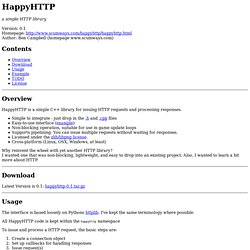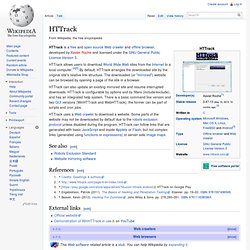

HappyHTTP - a simple HTTP library. A simple HTTP library Version: 0.1 Homepage: Author: Ben Campbell (homepage www.scumways.com) Contents Overview HappyHTTP is a simple C++ library for issuing HTTP requests and processing responses.

Simple to integrate - just drop in the .h and .cpp filesEasy-to-use interface (example)Non-blocking operation, suitable for use in game update loopsSupports pipelining. Why reinvent the wheel with yet another HTTP library? Download Latest Version is 0.1: happyhttp-0.1.tar.gz Usage The interface is based loosely on Pythons httplib. All HappyHTTP code is kept within the happyhttp namespace To issue and process a HTTP request, the basic steps are: Create a connection objectSet up callbacks for handling responsesIssue request(s)'pump' the connection at regular intervals. Connection object methods Connection( const char* host, int port ) Constructor. ~Connection() Destructor. Void connect() Don't need to call connect() explicitly as issuing a request will call it automatically if needed.
Callback types. Aria2 project. HTTrack. HTTrack is a free and open source Web crawler and offline browser, developed by Xavier Roche and licensed under the GNU General Public License Version 3.

HTTrack allows users to download World Wide Web sites from the Internet to a local computer.[4][5] By default, HTTrack arranges the downloaded site by the original site's relative link-structure. The downloaded (or "mirrored") website can be browsed by opening a page of the site in a browser. HTTrack can also update an existing mirrored site and resume interrupted downloads. HTTrack is configurable by options and by filters (include/exclude), and has an integrated help system. There is a basic command line version and two GUI versions (WinHTTrack and WebHTTrack); the former can be part of scripts and cron jobs. See also[edit] References[edit] External links[edit] Libwww. Libcurl is considered to be a modern replacement for libwww.[7] History[edit] From 25 November 1994 (version 2.17) Henrik Frystyk Nielsen was responsible for libwww.[16] On 21 March 1995, with the release of version 3.0, CERN put the full responsibility for libwww on the World Wide Web Consortium (W3C).[2] From 1995 onwards, the Line Mode Browser was no longer released separately, but part of the libwww package.[17] Features[edit] Libwww supports following protocols: Other features include: TLS and SSL can be used through OpenSSL.[22]gzip compression and decompression through zlib[23]a HTML,[24][25] RDF,[26] SGML[27] and XML[26] parser and a style sheet manager[28]an integration of a SQL database (using the MySQL) for i.e. web crawlers[29] Applications using libwww[edit] Over 19 applications have used libwww.[30] Integrated applications in libwww are:
Security: FHSCAN Core Library - Fast HTTP 1.1 library. cURL and libcurl.